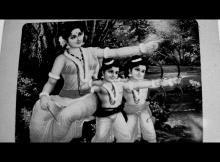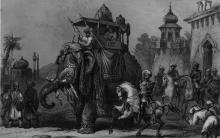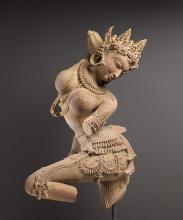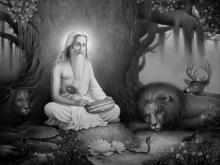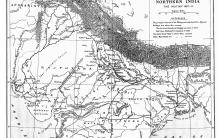Vālmīki also finds mention in the Śrīman-mahābhāratam too. In the sabhā-parva (7.19, *7.14 in critical text) Vālmīki’s presence in the court of Indra is mentioned by devarṣi Nārada. When bhagavān Śrī-kṛṣṇa goes to the court of Dhṛtarāṣṭra as the messenger, Vālmīki along with other maharṣis wish him success in the udyoga-parva (82.27, *81.27 in critical text). Later in droṇa-parva we see when Bhūriśravas has renounced the war and is in the state of dhyāna, Sātyaki beheads him.
Author:gsr
The Steadfastness in Yoga of a Jñānī
yuktaḥ karmaphalaṃ tyaktvā śāntimāpnoti naiṣṭhikīm
ayuktaḥ kāmakāreṇa phale sakto nibadhyate (BG 5.12)
ಭವನದ ಯಾವುದೇ ಕಾರ್ಯಕ್ರಮದಲ್ಲಿ ವೇದಘೋಷ ಆಗಬೇಕಿದ್ದಾಗ ಅದನ್ನು ರಾಜಗೋಪಾಲ್ ಅವರೇ ನಿರ್ವಹಿಸುತ್ತಿದ್ದರು. ಘೋಷಕ್ಕೊಂದು ಗಾತ್ರ ಬೇಕೆನಿಸಿದರೆ ಅವರಿಗೆ ಹತ್ತಿರದವರಾದ ಗಣೇಶ ಘನಪಾಠಿಗಳನ್ನು ಕರೆಸಿಕೊಳ್ಳುತ್ತಿದ್ದರು. ಇಬ್ಬರೂ ಘನಾಂತವಾಗಿ ಯಜುರ್ವೇದವನ್ನು ಬಲ್ಲವರಾದರೂ ರಾಜಗೋಪಾಲ್ ಅವರ ದನಿ ಮೃದು, ಮಧುರ, ಸಮಾಹಿತ. ಗಣೇಶ ಘನಪಾಠಿಗಳ ಧ್ವನಿಯಲ್ಲಿ ರೂಕ್ಷತೆ ಹೆಚ್ಚು; ಅಬ್ಬರವೂ ಮಿಗಿಲು. ಎಲ್ಲಿಯೂ ಅವರು ತಮ್ಮ ದನಿಯನ್ನೇ ಮುಂದುಮಾಡುತ್ತಿದ್ದರು. ಆದರೆ ರಾಜಗೋಪಾಲ್ ಯಾರೊಡನೆ ವೇದ ಹೇಳುವಾಗಲೂ ಅನುನಯ ಮತ್ತು ಅನುಸರಣೆಗಳನ್ನು ತಮ್ಮ ಆಧಾರಶ್ರುತಿಯಾಗಿ ಹಿಡಿಯುತ್ತಿದ್ದರು. ಅವರ ಈ ವರ್ತನೆ ನನಗೆ ಪ್ರಶ್ನಾರ್ಹವಾಗಿ ತೋರಿದಾಗ ಹೀಗೆ ಉತ್ತರವಿತ್ತಿದ್ದರು: “ಇದನ್ನು ನೀವು ನನ್ನ ಅಶಕ್ತಿ ಅಂತ ತಿಳಿಯಬೇಕಾಗಿಲ್ಲ.
ನಷ್ಟವಾದ ಸ್ವಾಯತ್ತತೆ
ಮೊದಲಿಗೆ ಬ್ರಿಟಿಷರು ಇಡೀ ರಾಜ್ಯವನ್ನು ತಮ್ಮ ಕೈವಶಮಾಡಿಕೊಂಡಿದ್ದರು. ಈಗ್ಗೆ ಐವತ್ತರವತ್ತು ವರ್ಷ ಹಿಂದೆ ಕನ್ನಡದಲ್ಲಿ ಒಂದು ಲಾವಣಿ ಎಲ್ಲಡೆ ಪ್ರಸಿದ್ಧವಾಗಿತ್ತು. ಅದರ ಕೆಲವು ಸಾಲುಗಳು ಹೀಗಿದ್ದವು:
ಮಹಿಳೆಯೊಳು ಭಾರತಭೂಮಿಯ ವೈಭವ-
ಬೆಡಗನು ಕೇಳಿದ ಬ್ರಿಟೀಷರು
ಮಹದಾಕಾಂಕ್ಷದಿ ಬಂದರು ಇಲ್ಲಿಗೆ
ವ್ಯಾಪಾರಕೋಸುಗ ಮೊದಲಿಹರು.
ಕ್ಲೈವನ ಕಪಟಾಚಾರದಿ ಭಾರತ-
ಖಂಡದಿ ನೆಲಸಿದ ಬ್ರಿಟೀಷರು
ದೈವಧರ್ಮವನು ದೃಷ್ಟಿಸದೆಮ್ಮಯ
ದೇಶದ ಸಿರಿಯನು ದೋಚಿದರು…
ಜನಸಾಮಾನ್ಯರಲ್ಲಿ ಎಷ್ಟುಮಟ್ಟಿನ ರೋಷ ಇತ್ತೆಂಬುದನ್ನು ಇದರಿಂದ ಊಹಿಸಬಹುದು.
The minister Vikramakesarin finished narrating the story and said, “O king! The elderly brāhmaṇa narrated these stories and said, ‘Trivikramasena got everything he desired by the grace of the vetāla. You also learn this mantra to bring a vetāla under your control; you’ll find your king Mṛgāṅkadatta.
The aesthetics of group dance is compromised because choreographers fail to keep track of the changes that a solo performing art needs to undergo in the process of adapting itself to a group performance. The effort is like trying to put a square nut into a circular hole. Unless we go to the level of abstraction and examine things, no transformation can successfully take place. For example, to turn a bronze sculpture of Gaṇapati into one of Śrīkṛṣṇa, we will need to first melt the sculpture we have with us. Then we will need to recast the bronze so obtained into the image of Śrīkṛṣṇa.
कूजन्तं राम रामेति मधुरं मधुराक्षरम् ।
आरुह्य कविता-शाखां वन्दे वाल्मीकि-कोकिलम् ॥
[Continuously singing the sweet syllables rāma, perched upon the branch - poetry, is the cuckoo - Vālmīki, we bow down to him]
ಘನಪಾಠಿಗಳು ಶಾಲೆಯ ಮುಖವನ್ನು ಕಂಡವರಲ್ಲ. ಇಂಗ್ಲಿಷನ್ನು ಕಲಿತವರಲ್ಲ. ಅವರು ಅಪ್ಪಟ ಗುರುಕುಲದ ವಿದ್ಯಾರ್ಥಿ. ಅವರ ತಾತನವರು ತಮಿಳುನಾಡಿನಲ್ಲಿ ನ್ಯಾಯಮೂರ್ತಿಗಳಾಗಿದ್ದರು. ಅವರಿಗೊಬ್ಬ ತಮ್ಮ. ಆತ ಮಾತ್ರ ವೇದ-ಶಾಸ್ತ್ರಗಳನ್ನು ಬಲ್ಲವರಾಗಿದ್ದರು; ವೈದಿಕವೃತ್ತಿಯಲ್ಲಿಯೇ ಉಳಿದಿದ್ದರು. ಅವರ ಹೆಸರು ಕೂಡ ರಾಜಗೋಪಾಲಶರ್ಮಾ ಎಂದೇ. ನ್ಯಾಯಮೂರ್ತಿಗಳಾಗಿದ್ದ ಅಣ್ಣ ಚಿಕ್ಕ ವಯಸ್ಸಿಗೇ ತೀರಿಕೊಂಡರು. ತಬ್ಬಲಿಗಳಾದ ಅವರ ಮಕ್ಕಳನ್ನು ತಮ್ಮ ರಾಜಗೋಪಾಲಶರ್ಮರೇ ಸಾಕಿ ಸಲಹಿದರು. ಅವರಿಗೆಲ್ಲ ವೇದಾಭ್ಯಾಸ ಮಾಡಿಸಿದರೂ ಲೌಕಿಕವಿದ್ಯೆಗಳಲ್ಲಿಯೇ ಮುಂದುವರಿಸಿ ಕೆಲಸ-ಬೊಗಸೆ ಕಲ್ಪಿಸಿದರು. ತಮ್ಮ ಮಕ್ಕಳಿಗೆ ಮಾತ್ರ ತಮ್ಮ ಹಾಗೆ ಅಪ್ಪಟ ವೈದಿಕವಿದ್ಯೆಗಳನ್ನು ಕಲಿಸಿ ಅದರಲ್ಲಿಯೇ ತೊಡಗಿಸಿದರು.
[07.04.2007ರಂದು ಗೋಖಲೆ ಸಾರ್ವಜನಿಕ ವಿಚಾರ ಸಂಸ್ಥೆಯಲ್ಲಿ 1857ರ ಸ್ವಾತಂತ್ರ್ಯ ಸಂಗ್ರಾಮದ ನೂರೈವತ್ತನೆಯ ವರ್ಷದ ಉತ್ಸವದ ಅಂಗವಾಗಿ ಖ್ಯಾತ ಇತಿಹಾಸಕಾರರಾದ ಡಾ॥ ಕೆ. ಶ್ರೀಪತಿ ಶಾಸ್ತ್ರಿಯವರ ಉಪನ್ಯಾಸ ಮಾಲಿಕೆಯನ್ನು ಏರ್ಪಡಿಸಿತ್ತು. ಅವರ ಉಪನ್ಯಾಸವನ್ನು ಶ್ರೀ. ಎಸ್. ಆರ್. ರಾಮಸ್ವಾಮಿಯವರು ಲಿಪೀಕರಿಸಿದ ಕೃತಿ ಇದಾಗಿದೆ.]
Story 24
31. The king Trivikramasena carried he corpse for the twenty-fourth time on his shoulders and left. The vetāla started narrating another story –

